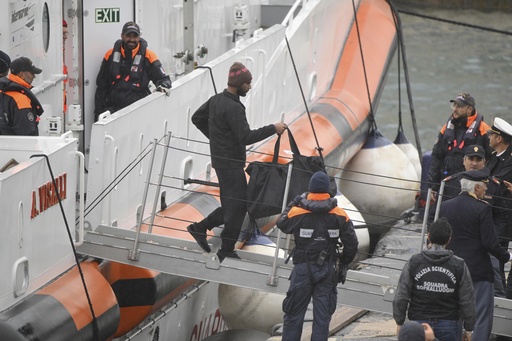
TIRANA, Albania — A high-ranking European Union official declined to express a stance on the recent immigration deal between Italy and Albania during a press briefing on Wednesday. She emphasized that the agreement is under strict observation by the EU.
European Commission President Ursula von der Leyen noted that the EU has been closely tracking the developments surrounding this arrangement from the outset. The agreement, which was finalized last November between Italian Prime Minister Giorgia Meloni and Albanian Prime Minister Edi Rama, outlines a plan for up to 3,000 migrants, rescued by the Italian coast guard from international waters, to be housed in Albania while their asylum claims are evaluated.
Italy is committed to accepting those migrants who receive asylum, while individuals whose applications are denied may face immediate deportation from Albania back to their home countries. Last week, the initial 12 migrants who were housed in Albanian facilities were returned to Italy just three days later due to a decision from Italian judges. The judges ruled that returning these individuals to Bangladesh and Egypt, which they classified as unsafe, would not be permissible.
In response to the legal challenges surrounding the immigration agreement, Italy’s far-right government enacted a new decree on Monday aimed at simplifying the judicial processes that threatened to obstruct the deal with Albania. This decree, which takes effect immediately, reduces the list of nations deemed “safe” by Italian law, allowing for accelerated deportation procedures for those migrants who do not obtain asylum.
The recent court ruling presents an early challenge to the five-year agreement between Italy and Albania. Prime Minister Giorgia Meloni has been an ardent supporter of the initiative, heralding it as a new framework for addressing illegal migration.
In a letter to EU leadership last December, shortly after the agreement was established, von der Leyen commended the “important initiatives” taken by various EU member states, emphasizing the operational collaboration between Italy and Albania as a model. She characterized this as innovative thinking that aligns with the principles of equitable responsibility-sharing with third nations in compliance with EU and international laws.
During her recent visit to Tirana, part of a wider tour to reassure Western Balkan nations about the EU’s commitment to enlargement, von der Leyen confined her comments on the Italy-Albania deal to its status as a “bilateral agreement” that the EU would solely monitor without further commentary. Meanwhile, human rights organizations and NGOs operating in the Mediterranean have criticized the agreement, warning that it sets a troubling precedent that contradicts international legal standards.
